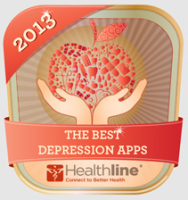










Popular Articles
Crazy-Makers: Dealing with Passive-Aggressive People
Why Are People Mean? Don't Take It Personally!
Struggling to Forgive: An Inability to Grieve
The Secret of Happiness: Let It Find You (But Make the Effort)
20 Steps to Better Self-Esteem
7 Rules and 8 Methods for Responding to Passive-aggressive People
What to Do When Your Jealousy Threatens to Destroy Your Marriage
Guide to How to Set Achieveable Goals
Catastrophe? Or Inconvenience?
Popular Audios
Audio Version of Article: Crazy-Makers: Passive-Aggressive People
Audio Version of Article: Why Are People Mean? Don't Take It Personally!
PsychNotes August 2013
by Monica A. Frank, Ph.D.
Clinical and Sport Psychologist

Index
Previous
Next
 August 30, 2013
August 30, 2013
BEST APPS OF 2013 FOR EATING DISORDERS
HealthLine.com states: "Cognitive Behavioral Therapy is a powerful technique for changing behavior. It can be useful for dealing with eating disorders. The Cognitive Diary CBT Self-Help app applies CBT to help with feelings of stress, anxiety, and irrational thinking.
The app addresses self-control problems and relationship issues that often accompany eating disorders. Keep track of events that stress or upset you and rate the strength of your emotional reactions. You can also access articles that correspond to your problem areas. Make sure to consult a health professional if you’re considering this app."

August 29, 2013
New Audio: DAILY MINDFULNESS PRACTICE--Eating a Piece of Chocolate

August 28, 2013
New Audio: DAILY MINDFULNESS PRACTICE--Eating a Piece of Fruit

 August 24, 2013
August 24, 2013
BEST APPS OF 2013 FOR ANXIETY DISORDERS

August 23, 2013
New Cognitive Diary Training Example: HUSBAND WANTS ME TO GO TO WORK EVENT
EMOTIONS: conflicted, annoyed
DISTRESS RATING: 7—feeling distressed, less in control
THOUGHTS: “I should go to the event because I want to make him happy. He will be upset with me if I'm not there to support him. Why should I have to go? He doesn't do things that are important to me. Last week he didn't go to my family dinner with me--he should have known how important it was to me.”
CAN YOU IDENTIFY THE IRRATIONAL THINKING IN THIS EXAMPLE? There are at least 3 irrational beliefs.
HOW CAN YOU CHANGE THE THINKING? What is another way of thinking about the situation that won't cause the feelings of conflicted and annoyed?
VIEW ANSWER

 August 21, 2013
August 21, 2013
BEST APPS OF 2013 FOR DEPRESSION

August 17, 2013
New Audio Version of Article: 10 COMMON ERRORS MADE IN COGNITIVE-BEHAVIORAL THERAPY

August 15, 2013
New Cognitive Diary Training Example: WIFE WON'T LEAVE ME ALONE WHEN I'M UPSET
EMOTIONS: anger, shame
DISTRESS RATING: 7—feeling distressed, less in control
THOUGHTS: “I think she was deliberately trying to aggravate me. She knew I needed to be alone. I didn't want to take it out on her. That's why I went to my office. I'm such a jerk. She didn't deserve to be yelled at. I need to control myself.”
CAN YOU IDENTIFY THE IRRATIONAL THINKING IN THIS EXAMPLE? There are at least 3 irrational beliefs.
HOW CAN YOU CHANGE THE THINKING? What is another way of thinking about the situation that won't cause the feelings of anger and shame?
VIEW ANSWER

August 13, 2013
New Audio Version of Article: STRUGGLING TO FORGIVE: AN INABILITY TO GRIEVE

 August 9, 2013
August 9, 2013
Frequently over the years of my practice I've had new clients who recently left bad relationships and want to prevent a recurrence of the same scenario. However, two common obstacles too often occur, both of which are related to difficulty handling grief and loss.
The first obstacle is related to finalizing the relationship. Often, although the relationship is over, there is a period of returning to the former partner and leaving the relationship again and again until they are finally convinced that the partner won't change.
The second obstacle is when meeting a new person and seeing the "red flags" they are in denial of the message of those red flags. They ignore the warning signals due to a desperate need to be in a relationship. More important to them is the need to be wanted that the need to be in a healthy relationship. READ MORE

August 8, 2013
FINDING YOUR PASSION
If we examined all the U.S. college graduates who currently are not working, I suspect that the majority of them did not develop a plan based on achieving their own sense of identity before or during college. As a result, they either graduated with a general degree or a degree in a field they were "supposed" to pursue. It is doubtful they were following their passion.
Parents may inadvertently thwart the pursuit of a passion by nudging towards or even insisting upon certain career choices. The identity development process in young adulthood creates fear in many parents because if REQUIRES the questioning of everything the child has been taught so that the young adult can create his/her own path. Although that path may include some of what the child has been taught, the process of developing it is a time of crisis and even rejection of parental teachings. This is fearful to parents who have tried to control their child's life so as to prevent failure and unhappiness
Unfortunately, however, such control is more likely to lead to failure and unhappiness than prevent it. Young adults need the opportunity to discover their passion and develop their own identity, not one that is chosen for them.

August 6, 2013
Cognitive Diary Training Example: HUSBAND SAYS "I DON'T CARE"
EMOTIONS: disappointment, hurt
DISTRESS RATING: 6—feeling bad
THOUGHTS: “He's not showing any excitement about going out with me so he must not really want to. He probably has other things he would rather do. Maybe he's not attracted to me. He must not love me the way he used to. What a jerk!”
CAN YOU IDENTIFY THE IRRATIONAL THINKING IN THIS EXAMPLE? There are at least 3 irrational beliefs.
HOW CAN YOU CHANGE THE THINKING? What is another way of thinking about the situation that won't cause the feelings of disappointment and hurt?
VIEW ANSWER













